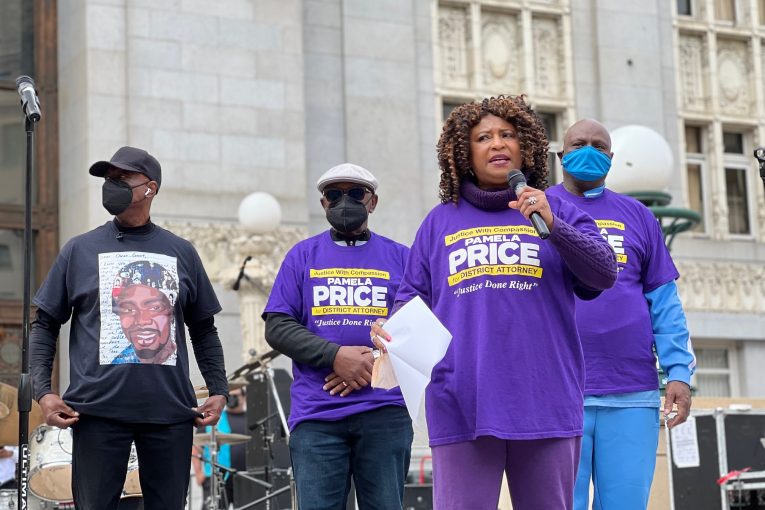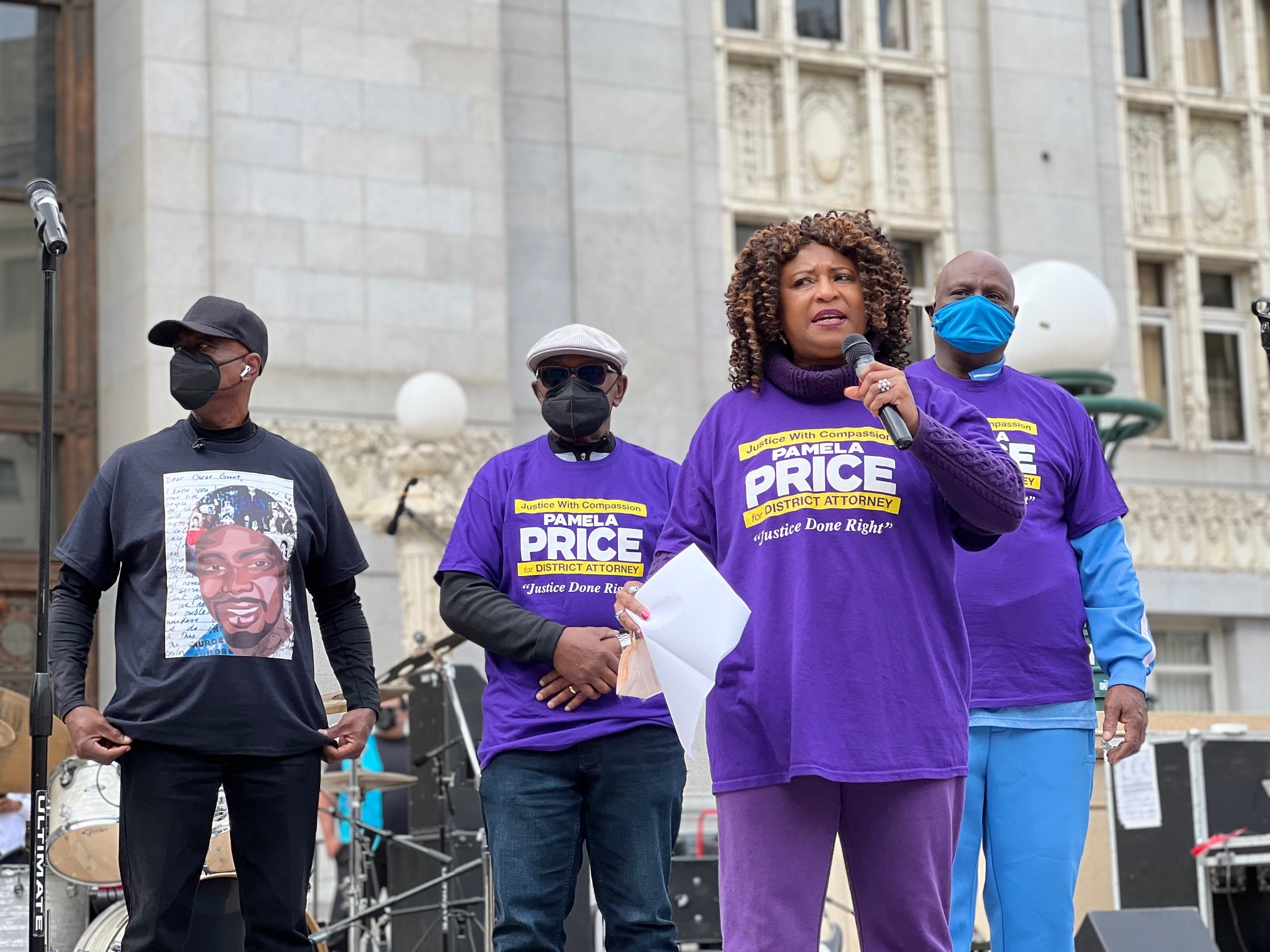

By David M. Greenwald
Executive Editor
When San Francisco voted to recall Chesa Boudin in June, many in the media believed “it was the start of a backlash against reform-minded prosecutors.” But that’s not what happened and across the Bay in Oakland this November, reformer Pamela Price becomes the first elected Black District Attorney in the community which birthed the Black Panther Movement in the 1960s.
“(Pamela Price) is one of several other progressive reform-minded prosecutors who was elected or reelected in November. Certainly a sign that the movement is growing still strong and that some of the hype of concerns about what the recall election across the water meant for the movement were, you know, overhyped,.” Mona Sahaf, Deputy Director of Vera Institute of Justice’s “Reshaping Prosecution” program, told the Vanguard.
Sahaf joined Vera in July 2021 to lead the federal strategy for the Reshaping Prosecution program after working for six years as a prosecutor in the Human Rights and Special Prosecutions Section of the Department of Justice (DOJ).
For Sahaf, Chesa Boudin was more about the alignment of a number of forces than necessarily a harbinger of doom for the reform movement.
“I think there have been several deep dives into Chesa Boudin’s recall including how well-resourced it was, how few voters came out, the fact that the voters had to vote either for a recall or not—there wasn’t a third option.,” she explained.
But, as Sahaf pointed out, Pamela Price “ran on a lot of the same values and platform promises Chesa Boudin did. So folks who out there who thought that his recall was maybe some bellwether for the reform movement, I think were proven wrong.”
In fact, in November, “The people in Alameda County and a number of other counties in both blue and red states around the country chose reform-minded prosecutors in this election.”
A study out the University of Toronto from October found once again, comparing trends in recorded crime across all counties in Florida and California since 2015, “We find no evidence to support the claim that progressive prosecutors were responsible for the increase in homicide during the pandemic or before it.”
“A major new study by researchers at the @UofT affirms our mission: Progressive district attorneys who are committed to reform and treat people with dignity are more effective at combating crime than so-called ‘tough-on-crime’ prosecutors,” Los Angeles DA George Gascón tweeted.
“This new study finds that the increase in homicides was more extreme in cities with the old-school, ‘tough-on-crime’ prosecutors or district attorneys,” Gascón continued. “The study even looked at our work right here in LA County. They found ‘no evidence’ that progressive, humane prosecution increases the homicide rate.”
He added, “Here’s the bottom line: The data proves that criminal justice reform is the best way to keep us safe. And those that say reform leads to violence are flat-out wrong.”
Sahaf explained, “There isn’t data showing that the rises in crime are connected to the policies of reformed prosecutors. As we know, unfortunately, crime has risen across the country, including in red states and red counties, where prosecutors are still much more traditional and focused on the tools of incarceration and charging.”
She added, “I think a lot of voters on both sides of the aisle are very frustrated with politicians who are not providing solutions that are really making them safer, and creating long term sustainable safety in their communities. Clearly, the priorities and methods that more traditional prosecutors have used and are using are in a number of cities where unfortunately certain types of crimes have arisen … aren’t achieving, are not lowering crime, are not increasing public safety.”
She said, “Thanks to so many advocates and academics, the public is much more educated about how harmful incarceration pre-trial detention and lengthy sentences are on people, their families and their communities.”
When the voters are polled, overwhelmingly they support criminal justice reform.
Just before the election, a major polling efforts conducted by leading Democratic and Republican pollsters, Benenson Strategy Group and Public Opinion Strategies, found “that despite the attempts of some candidates to make crime and criminal justice reform political wedge issues in the midterm elections, voters from both parties want their elected officials and candidates to support bold reforms including state and federal policy changes that would reduce incarceration.”
The poll found that 8 in 10 likely voters support criminal justice reform, including 74% of Republicans, 80% of independents, and 85% of Democrats, and two-thirds of voters (66%) believe the criminal justice system needs a complete overhaul or major reform.
It also found, “Voters are more than twice as likely to believe we need more reforms to reduce incarceration than to believe we should undo policy changes that have reduced incarceration. As a result, 58% of voters would be more likely to vote for a candidate who supports criminal justice reform compared to only 13% who would be less likely.”
Pamela Price was able to win by tapping into this sentiment.
“Certainly she comes from the perspective that the criminal legal system causes harm and has caused historically lots of harm in communities like Oakland. So she sees that the system as it is, the status quo isn’t defensible. Because not only is it not making us safer and not addressing public safety for so many people, but it’s also causing harm when used,” Sahaf said.
She added that Price ran on “certain policies that other reform-minded prosecutors have also used, including treating children like children, looking to restorative justice to address harm as opposed to only seeking solutions in the criminal system, seeking alternatives to incarceration and treating mental health and substance use disorders as the medical issues they are, and not as problems that can be solved through incarceration.”
Price had “really that fundamental understanding of the fact that the system’s tools can be incredibly destabilizing and harmful and negatively impact public safety, that framing and understanding is probably one of the most important things she brings.”
Pamela Price also brought a historic personal story to this narrative. Oakland is the birthplace of the Black Panther movement. She’s the first black elected district attorney in Alameda County.
Sahaf also noted, “It is historic seeing the names of her supporters, including luminaries like Angela Davis and other incredible civil rights leaders from the area.” She added, “Seeing a Black woman on top of the DA’s office there is pretty amazing when you consider so much of the harm that has flowed from prosecutors’ offices to Black women and Black men and their families.”
And Price did this hard way, bucking the money and law enforcement interests and even some of the Democratic power structure in Oakland and Alameda to do so.
Sahaf added, “So I think we take a few lessons from that. One is voters are smarter than some of the talking points and the messaging that was beating them over the heads through these elections. They know what they want, they know that they are interested in reform and action and solutions that are going to increase their safety. They know, looking back at, you know, decades of prosecutors who are traditional, that they don’t have the secret to success.”






